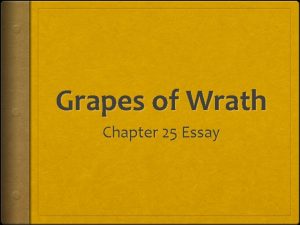The Geography in Grapes of Wrath Karen Adkins












- Slides: 12

The Geography in Grapes of Wrath Karen Adkins and Gabe Haywood

Quote #1 - Chapter 1 “To the red country and part of the gray country of Oklahoma, the last rains came gently, and they did not cut the scarred earth” (Steinbeck, 1).

Quote #1 Explanation ● Red = red soil Gray = normal ● Red represents danger and warning ● Gray represents confusion and sadness

Quote #1 Paragraph The red country and gray country has a literal meaning that there was a portion of land in Oklahoma full of red clay and another of with normal brown-gray color. By looking deeper into the quote, you can look at what those two colors represent. Red is usually associated with danger, bad, warnings, and blood. Gray is compared with confusion or uncertainty or even sadness. This can be viewed as a form of foreshadowing for what the Joad family would endure during the journey ahead of them.

Quote #2 pg. 229 “‘I can’t he’p it I can’t leave this here water. ’” “‘It ain’t no use, I’m sad, but I can’t he’p it. I got to go. ’ He turned abruptly and walked downstream along the shore” (Steinbeck, 229).

Quote #2 Explanation ● Noah has problems ● He must overcome them ● River gives him hope

Quote #2 Paragraph Noah has problems that he wants to overcome. He knows that if he continues to go on the journey, that he might not be able to handle it because it would be overwhelming. When he sees the river, he sees hope; the river/water represents hope. Since he is the first to leave freely, it shows the beginning of the Joad family falling apart.

Quote #3 pg. 222 “‘what’s the desert like? ’ ‘I don’t know. I seen pitchers once says a desert. they was bones ever’place. ’. . . ‘we gonna see them bones? ’ ‘Maybe, I don’ know. Gonna go ‘crost her at night That’s what Tom said. Tom says we get the livin’ Jesus burned out of us if we go in daylight’” (Steinbeck, 222).

Quote #3 Explanation ● Foreshadowing ● Hard path ● Oasis

Quote #3 Paragraph When they are talking about the desert, they are foreshadowing what is to come. The desert is dry and hot during the day, which is difficult to go through. In the future they will encounter more situations that are painful, lamentable, but they have to keep going so that they can make it through the end. Or at least to an oasis.

Synthesis Paragraph Geography is one of the most important ways that the author can use symbolism thought out a work. Merely using the location and the land’s features, the reader can learn what kind of theme and mood the author is trying to create for the readers as well as for the characters. The peace and hope of the river, to the confusing unknown of the red country and the gray county, all the way to the determination to escape a fiery desert; these are all examples of how a location can affect the mood and attitude of the storyline and even the writing style.

Works Cited Steinbeck, John. The Grapes of Wrath. New York: Viking, 1939. Print. Foster, Thomas C. How to Read Literature like a Professor: A Lively and Entertaining Guide to Reading between the Lines. New York: Quill, 2003. Print.
 Themes of grapes of wrath
Themes of grapes of wrath Chapter 10 grapes of wrath
Chapter 10 grapes of wrath The grapes of wrath chapter 10
The grapes of wrath chapter 10 Grapes of wrath ch 25
Grapes of wrath ch 25 Themes of the grapes of wrath
Themes of the grapes of wrath Themes of grapes of wrath
Themes of grapes of wrath Symbolism in the grapes of wrath
Symbolism in the grapes of wrath The grapes of wrath chapter 15
The grapes of wrath chapter 15 The grapes of wrath themes
The grapes of wrath themes Amber adkins
Amber adkins Meritbase
Meritbase Brooke adkins
Brooke adkins Frq ap human geography format
Frq ap human geography format
















